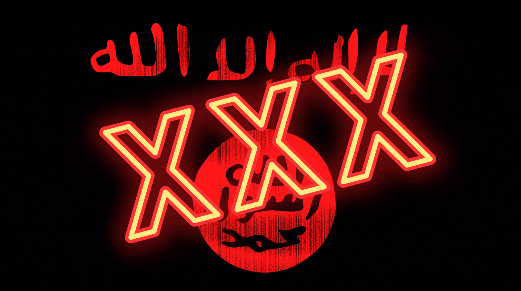
How Anime porn became a weapon for rival terrorist groups on Facebook
The Facebook group “Soldiers of the Righteous Caliphate” was a bubbling cauldron of noxious extremist support drawn from rival groups including the Islamic State, and the Taliban.
It was filled with beheading imagery, military exercises, hand-drawn faceless portraits of the late ISIS leader Abu Bakr al-Baghdadi, and—somehow—plenty of anime porn.
With just over 24,000 members, the Facebook group represented a perfect case study in the malicious mix of extremist support on the platform, which continues to evade detection and gain traction. So why was it full of pornography?
There has been plenty of analysis about extremist groups and how their content evades detection, but not many reports have focused on the antics of people trying to fight these extremists online. Some of these vigilantes are lone actors, others are part of “cyberarmies” aligned with other extremist groups fighting rival terrorist supporters online.
The “Soldiers of the Righteous Caliphate” group was a microcosm of vigilante digital detractors at play. It was the digital equivalent of a wrestling cage match between cyberarmies of extremist group supporters targeting the Islamic State, Hay’at Tahrir al-Sham and the Taliban.
The battlefields of these cyberarmies and the conflict they spurred in weaponized group posts and comment sections represents one of the lesser known moderation challenges for Facebook.
Their weapons of choice: anime porn and numbered kama sutra positions. Put simply, when terrorist supporters go violent on Facebook, their enemies tend to go pornographic.
For instance, a 15-position numbered Kama Sutra menu of sex acts was recently shared with a post that read “the army of the Caliphate is on the path set by Hind, daughter of Abu Sufyan.” Some sex posters in the group used more straightforward messaging.
Using a police line-up of naked female anime characters, each with progressively larger busts, one detractor derided the “dogs of hell,” a well-known Middle Eastern moniker for Islamic State supporters.
Other lone actor vigilantes targeting the Taliban supporters in the group made sexual references about the Taliban, posting dancing videos of young Taliban fighters with emojis that represented index fingers into OK signs as a means to suggest the Taliban were homosexuals who “love dark holes.” When Hay’at Tahrir al-Sham accounts posted adoring photos of Abu Muhammad al-Joulani, the group’s leader, a non-extremist account, posted a doctored photo of him having sex with himself, in reference what some to believe is his narcissistic nature.
The question, however, is just how networked are these posters? Does it indicate the presence of cyberarmies, or are these just average people with a taste for shitposting terrorist supporters?
The answer is both.
All of these explicit prevention efforts are often used by the most fringe of the terrorist group detectors as well as networks of opposing extremist groups on Facebook.
The answer to why these tactics are utilized is buried in a large tranche of internal Facebook documents released in late October to 12 media organizations, which The Daily Beast has reviewed.
Prepared in December 2020, the issues noted by Facebook employees actually provide researchers with a better understanding of how networks of anti-extremist accounts, as well as the cyberarmies supportive of a range of extremist groups, operate on the platform to take on terrorist content when the platform does not.
In the papers, the Middle East and North Africa Integrity Team at Facebook reported that “Iraq is a proxy for cyberarmies working on reporting content in order to block certain pages or content.” The papers went on to mention that “reporters in Iraq understand the zero tolerance FB has for CN [child nudity] and this is used by cyberarmies to close certain pages.”
While none of the lone actors or the extremist cyberarmies fighting one another in the “Soldiers of the Righteous Caliphate” used child nudity or children as extremist repellents, a number did use pornographic material to troll extremists and attempt to get their accounts banned.
Source: The Daily Beast





